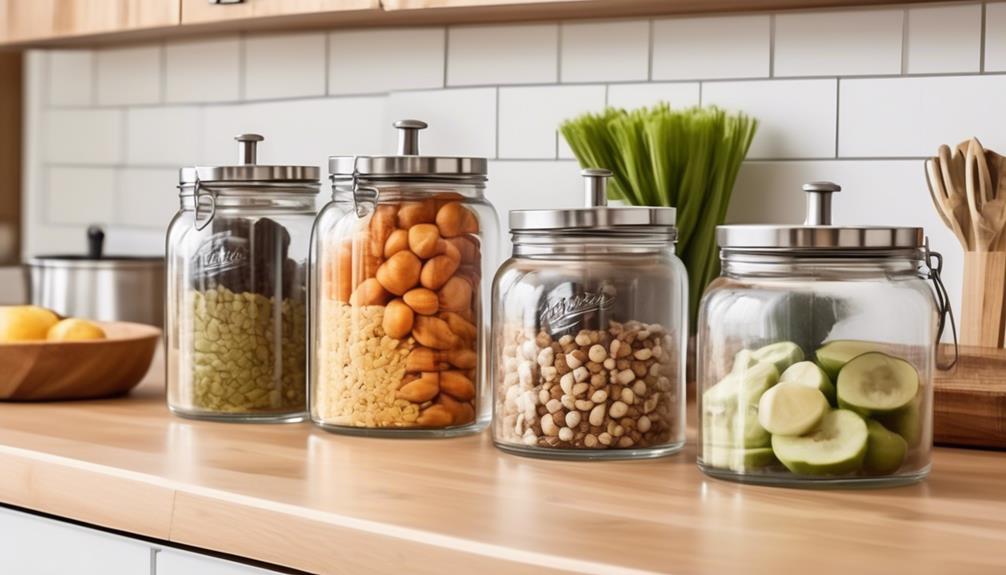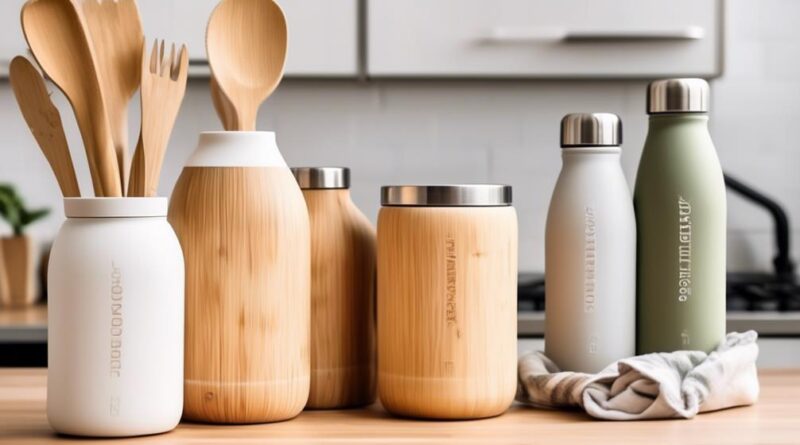Why Choose Sustainable Plastic-Free Alternatives for Home?
You may not realize it, but the choices you make for your home have a significant impact on the environment.
Have you ever thought about the potential benefits of switching to sustainable, plastic-free alternatives? Whether it's in your kitchen, bathroom, cleaning supplies, or storage options, there are numerous eco-friendly solutions that not only reduce waste but also contribute to a healthier planet.
Making simple changes in your household can lead to a more sustainable lifestyle and a cleaner environment, but how exactly can these choices benefit you and the world around you?
Benefits of Plastic-Free Alternatives
When you choose plastic-free alternatives, you reduce your environmental impact and contribute to a healthier planet. By opting for sustainable options such as reusable containers, bamboo utensils, and stainless steel straws, you actively decrease the amount of plastic waste that ends up in landfills and oceans. This reduction in plastic usage helps to mitigate the harmful effects that plastic has on the environment, particularly on marine life.
Additionally, embracing plastic-free alternatives can lead to personal health benefits. Many traditional plastic products contain chemicals such as BPA and phthalates, which have been linked to various health issues. By choosing plastic-free alternatives, you can minimize your exposure to these potentially harmful substances, promoting a healthier lifestyle for you and your family.
Moreover, the environmental impact of plastic production and disposal is substantial. Plastic is derived from fossil fuels, and its manufacturing process contributes to greenhouse gas emissions and resource depletion. By embracing plastic-free alternatives, you indirectly lower the demand for new plastic products, thereby reducing the environmental strain caused by plastic production.
This shift towards sustainability also encourages innovation in eco-friendly materials and promotes a circular economy, where products are reused, recycled, or repurposed, further lessening the environmental impact.
Eco-Friendly Kitchen Solutions
By choosing eco-friendly kitchen solutions, you can further reduce your environmental impact and contribute to a healthier planet while optimizing your household practices.
When it comes to eco-friendly kitchen appliances, consider investing in energy-efficient models. These appliances are designed to consume less energy, reducing your household's carbon footprint. Look for eco-friendly certifications such as Energy Star to ensure that your appliances meet high environmental standards.
Additionally, sustainable cookware made from materials like stainless steel, cast iron, or ceramic not only reduces plastic use but also minimizes the release of harmful chemicals into your food. These durable alternatives often outlast their non-sustainable counterparts, reducing waste in the long run.
In addition to eco-friendly appliances and cookware, incorporating practices such as composting organic waste and reducing single-use plastics in the kitchen can make a significant difference. Composting not only diverts organic waste from landfills but also produces nutrient-rich compost for gardening.
Furthermore, replacing single-use plastic items with reusable alternatives such as silicone storage bags, glass containers, and stainless steel straws can substantially minimize plastic pollution.
Sustainable Bathroom Products
Consider switching to sustainable bathroom products, such as bamboo toothbrushes and refillable soap dispensers, to reduce plastic waste and minimize your environmental impact.
Sustainable toothbrushes, made from biodegradable bamboo, are an excellent alternative to traditional plastic toothbrushes. Bamboo is a fast-growing, renewable resource, making it an eco-friendly choice for your oral care routine. Additionally, bamboo toothbrushes often come with replaceable brush heads, reducing the amount of waste generated over time.
Another sustainable option for your bathroom is bamboo toilet paper. Unlike conventional toilet paper, bamboo toilet paper is made from a rapidly renewable resource that doesn't require extensive water and pesticide use for cultivation. Bamboo also has natural antibacterial properties, making it a hygienic choice for your bathroom.
In addition to these products, using refillable soap dispensers can significantly reduce the amount of plastic packaging that ends up in landfills or oceans. Instead of purchasing single-use plastic bottles of hand soap or body wash, opt for refillable dispensers and bulk products. This small change can have a big impact on reducing plastic waste in your home.
Zero Waste Cleaning Supplies
Looking for eco-friendly alternatives for your cleaning supplies? Zero waste solutions are becoming increasingly popular as people seek to minimize their environmental impact. When it comes to eco friendly cleaning, there are several options that can help you reduce waste and promote sustainability in your home.
One way to embrace zero waste cleaning supplies is by using refillable containers. Many companies now offer cleaning products in bulk, allowing you to refill your existing bottles instead of purchasing new ones. This not only reduces plastic waste but also minimizes the energy and resources required to produce new packaging.
Another eco-friendly option is to make your own cleaning solutions using simple ingredients like vinegar, baking soda, and essential oils. Not only are these ingredients effective for cleaning, but they also come in minimal or recyclable packaging, reducing waste even further. Additionally, you can invest in reusable cleaning tools such as microfiber cloths, sponges, and scrub brushes, which can be washed and reused multiple times, cutting down on the need for disposable cleaning products.
Opting for concentrated cleaning products is also a great way to minimize waste. These concentrates often come in smaller, more eco-friendly packaging and can be diluted with water at home, reducing the overall amount of packaging waste.
Plastic-Free Storage Options
As you continue to reduce waste and promote sustainability in your home through zero waste cleaning supplies, it's important to also consider plastic-free storage options for maintaining an eco-friendly living space. Eco friendly organization and sustainable food containers are essential components of a sustainable lifestyle.
Here are some plastic-free storage options to help you create an eco-friendly and organized living space:
- Bamboo or Wooden Containers: Imagine replacing your plastic storage containers with beautifully crafted bamboo or wooden containers. These containers not only provide a sustainable alternative but also add a touch of natural elegance to your kitchen or pantry.
- Glass Jars and Containers: Visualize shelves filled with neatly arranged glass jars containing various food items. Glass jars aren't only a sustainable option but also provide a clear view of the contents, making it easier to organize and access your pantry items.
- Fabric or Beeswax Wraps: Envision using fabric wraps or beeswax wraps to cover bowls and wrap food items instead of relying on plastic wraps. These reusable and biodegradable options are perfect for sustainable food storage and reducing plastic waste in your kitchen.
Compostable and Biodegradable Materials
You can explore various compostable and biodegradable materials that offer sustainable alternatives for everyday household items. These materials, when used in products, can significantly reduce the environmental impact of your daily consumption. Compostable materials are organic substances that decompose into nutrient-rich soil when placed in a composting environment. On the other hand, biodegradable materials break down naturally into non-toxic components with the help of microorganisms. Both options offer eco-friendly solutions to reduce the burden of non-biodegradable waste on the environment.
Consumer behavior plays a crucial role in the widespread adoption of compostable and biodegradable materials. By choosing products made from these materials, you can directly contribute to the reduction of landfill waste and marine pollution. Your decision to opt for compostable and biodegradable alternatives encourages manufacturers to prioritize sustainable practices, leading to a positive ripple effect in the market.
It's essential to understand the distinction between compostable and biodegradable materials to make informed choices. While both options offer environmentally friendly solutions, compostable materials specifically contribute to the enrichment of soil, making them an excellent choice for organic waste disposal. By incorporating these materials into your daily life, you actively participate in promoting a more sustainable and environmentally conscious approach to consumption.
Reusable and Refillable Household Items

Consider incorporating reusable and refillable household items into your daily routine to minimize single-use plastic waste and contribute to a more sustainable lifestyle. By making simple changes in your household items, you can significantly reduce your environmental impact.
- Sustainable Laundry
Invest in durable, reusable laundry bags or laundry balls to replace single-use detergent pods. These alternatives not only reduce plastic waste but also minimize the release of harmful chemicals into the water supply. Look for refillable detergent stations in your area or opt for eco-friendly laundry detergent packaged in recyclable or refillable containers.
- Refillable Cosmetics
Transition to refillable makeup and skincare products to cut down on plastic packaging. Many beauty brands now offer refill stations for products like foundation, lipstick, and moisturizers, allowing you to reuse the product's original container. This not only reduces plastic waste but also encourages a circular economy for beauty products.
- Reusable Cleaning Supplies
Swap out disposable cleaning wipes and paper towels for reusable alternatives such as microfiber cloths, washable mop pads, and refillable spray bottles. Additionally, consider using concentrated cleaning solutions that can be diluted with water in reusable containers to reduce the need for single-use plastic packaging.
Incorporating these reusable and refillable household items not only benefits the environment but also promotes a more sustainable and mindful lifestyle. Making these small changes in your daily routine can have a significant positive impact on reducing plastic waste and contributing to a greener future.
Sustainable Plastic-Free Decor and Furniture
Choose sustainable alternatives for decor and furniture to reduce plastic usage in your home. When it comes to sustainable plastic-free decor and furniture, eco friendly lighting and biodegradable textiles are excellent options to consider.
Eco friendly lighting, such as LED fixtures, not only reduces energy consumption but also minimizes the use of plastic components in traditional lighting. By opting for eco friendly lighting, you can enhance the ambiance of your living spaces while lowering your environmental impact.
In addition to eco friendly lighting, incorporating biodegradable textiles into your decor and furniture choices can further reduce plastic usage in your home. Look for curtains, upholstery, and decorative items made from natural fibers like organic cotton, hemp, or bamboo. These materials aren't only biodegradable but also renewable, making them a sustainable choice for your home decor.
When selecting furniture, prioritize pieces made from sustainable materials such as reclaimed wood, bamboo, or metal. These options aren't only durable and stylish but also help to minimize the demand for plastic-based furniture and decor.
Frequently Asked Questions
How Can I Effectively Transition My Household to Be Completely Plastic-Free?
To effectively transition your household to be completely plastic-free, start by implementing small changes such as using reusable bags, bottles, and containers. Look for eco-friendly products like bamboo toothbrushes and stainless steel straws.
What Are Some Common Misconceptions About Sustainable Plastic-Free Alternatives?
You might have misconceptions about sustainable plastic-free alternatives. Many people believe they're inconvenient and expensive, but in reality, they can be affordable and have a positive environmental impact. It's important to separate fact from fiction.
Are There Any Sustainable Plastic-Free Options for Outdoor and Garden Products?
Looking for eco-friendly gardening and outdoor sustainability solutions? Consider bamboo or metal garden tools, terracotta or ceramic planters, and natural fiber outdoor furniture. These sustainable plastic-free options are great for your garden and outdoor space.
How Can I Find Affordable Sustainable Plastic-Free Alternatives for My Home?
You can find affordable sustainable plastic-free alternatives for your home by exploring online resources. Many websites offer a wide range of eco-friendly options for everyday household items, making it easy to make sustainable choices on a budget.
What Are Some Innovative and Cutting-Edge Sustainable Plastic-Free Products That Are Available in the Market?
Looking for innovative eco-friendly kitchenware and biodegradable packaging options? Check out the market for cutting-edge sustainable products that are now available. They offer practical and environmentally friendly alternatives for your home.
Conclusion
So, why choose sustainable plastic-free alternatives for your home?
By making the switch, you can enjoy the benefits of eco-friendly kitchen solutions, sustainable bathroom products, zero waste cleaning supplies, plastic-free storage options, compostable and biodegradable materials, reusable and refillable household items, and sustainable plastic-free decor and furniture.
Not only will you reduce your environmental impact, but you'll also create a healthier and more sustainable living space for you and your family.
Make the change today for a greener tomorrow.
